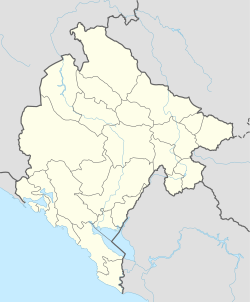Tuzi
Tuzi Tuz | |
|---|---|
Town and Municipality | |
 View of the Prokletije | |
| Coordinates: 42°21′56″N 19°19′53″E / 42.36556°N 19.33139°E | |
| Country | |
| Government | |
| • Mayor | Nik Gjeloshaj (AA) |
| Population (2011) | |
| • Urban | 4,748 |
| • Rural | 7,348 |
| • Municipality | 12,096 |
| Time zone | UTC+1 (CET) |
| • Summer (DST) | UTC+2 (CEST) |
| Postal code | 81206 |
| Area code | +382 20 |
| Vehicle registration | TZ |
| Climate | Cfa |
Tuzi (Montenegrin Cyrillic: Тузи, pronounced [tǔːzi]; Template:Lang-sq) is a small town and seat of Tuzi Municipality, Montenegro. It is located along a main road between the city of Podgorica and the Albanian border crossing, just a few kilometers north of Lake Skadar. The Church of St. Anthony and Qazimbeg's Mosque are located in the centre of the town. Tuzi is the youngest municipality in Montenegro, becoming an independent municipality since 1st September 2018.
Geography
Tuzi is situated to the northwest of Lake Skadar, 10 km from Podgorica, 150 km from Dubrovnik (Croatia) and 130 km to Tirana (Albania). It is located in surrounded by forests and mountains that are further connected with Prokletije. As in all cities in Montenegro, Tuzi has a health centre, elementary school "Mahmut Lekić", high school "25 Maj" and a kindergarten "Đina Vrbica". Later developments also include a football stadium, Korita, Lake of Rikavac, Vitoja, wellspring in Traboin, Cijevna river etc.
History
The town of Tuzi is situated between Podgorica and the Skadar lake. The Albanian community of Tuzi descend from the surrounding tribes of Hoti, Gruda, Trieshi and Koja, part of the Malësor tribes. They are mostly Roman Catholic, embracing the Christianity during the 5th century A.D. When the Great Schism occurred in 1054, tribes of Tuzi embraced Western Christianity, which will later be known as Catholicism. When Ottomans came to Balkan during 14th century, many people from the mentioned tribes converted to Islam, but they remained tightly related to their Catholic relatives. Some of them received new surnames from the Ottomans, usually with Muslim prefixes, but also a great part of them kept their original surnames, that's why today there are Albanian families with same surnames, but different religion (Muslim or Catholic) like for example Gjokaj, Nikaj, Dreshaj etc.
Sports
Demographics
According to 2011 census, the town of Tuzi has a population of 4,748,[1] while Tuzi Municipality has 12,096 residents.[2] Out of this, roughly half are Albanians, but there is also a significant percentage of Bosniaks, Muslims by nationality, and Montenegrins.
- Albanians - 2,383
- Bosniaks - 932
- Muslims - 1,763
- Montenegrins - 554
- Romani - 111
- Serbs - 13
- Others - 172
- Undeclared/undefined - 122
- Regional affiliation - 7
- Total - 4,748
Religious demographics
- 26.4% - Roman Catholic
- 71.6% - Islam
- 2% - Eastern Orthodox
References
- ^ http://www.monstat.org/userfiles/file/popis2011/podaci%20naselja/Tabela%20N1.xls Population and Housing Census in Montenegro - ethnicity

- ^ "2011 Census Preliminary Results" (PDF).



